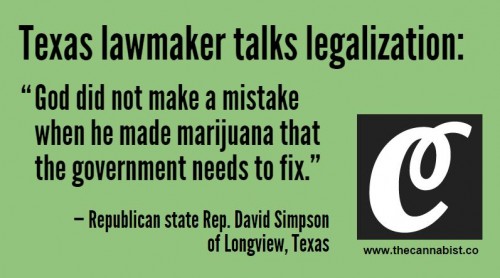AUSTIN, TEXAS — On a Wednesday night in early April, dozens of veterans with PTSD, several families of children with severe epilepsy, a wealthy suburban couple whose son’s life was ruined when he got caught smoking a roach, a Republican grandmother, a U.S. District judge, a professor from Houston, at least a dozen activists, a small handful of dedicated hippies and the guy who sells me pot walked into a basement hearing room in the annex of the Texas State Capitol building.
They’d come to testify on behalf of two Texas House bills, one that would decriminalize marijuana possession and one that would outright end marijuana prohibition in Texas forever. It was 9:30 p.m, and they’d been waiting all day for the regular business of the House to end so they could say their piece. They crammed the room.
Texas marijuana reform was a war of attrition that they planned to win.

The House Committee on Criminal Jurisprudence, finally free of its daily responsibilities of the House floor, sat in front of them, listening with great interest — likely greater interest than any government officials had ever listened to marijuana-rights activists in Texas before. It was a rare moment. Of the seven people on the committee, two of them had introduced the bills under discussion.
They heard a litany of woes that would have made contestants on the old “Queen For A Day” TV game show blush. A paramedic and his wife, as white and all-American as a Chevy Silverado ad, sat alongside their desperately ill 6-year-old son, whose poor brain is continually wracked by uncontrollable seizures. They begged this committee to give them access to the medical marijuana they say their boy so desperately needed. There were emotional appeals from former soldiers. Policy nerds gave rational testimony citing the cost and inefficiency of marijuana laws.
A small handful of people testified against the law as well, but they were outnumbered 20 to one.
Texas marijuana bills: Full legalization in House; CBD oil in Senate
Texas marijuana poll: When will the Lone Star State legalize cannabis?
Working toward change: Watch the commercial Texas pot activists have running across the state
Watch The Cannabist Show. Follow The Cannabist on Twitter and Facebook
The testimony went on deep into the night. At 1:30 in the morning, Ann Lee, the founder of Republicans Against Marijuana Prohibition, sat in front of the panel, wearing red, white and blue. This would have been her 64th wedding anniversary, she told the panel, but her husband had died the night before. Still, she was there, testifying for marijuana reform.
“I am so angry at the evil this law does to our country,” she says.
Lee’s son was injured in an accident in the early 1990s. Marijuana was the only way he could heal his pain. He moved to California, started one of the first medical-marijuana dispensaries and founded Oaksterdam University. Like so many other people of her generation, Lee had lived her whole life thinking that marijuana was evil. Now she knew the truth.
“I resent the fact that our son had to move to Oakland, California,” she said. “California, of all places! We are better than California, aren’t we?”
Those are terms that any Texan can understand.
Flirting with legalization
Even by its usual standards, Texas is enduring a floridly wackadoo political season. But the craziest thing of all is that the state has made some serious headway in legalizing marijuana. There are 11 marijuana-reform bills floating around the Legislature at some part of the process. The two bills mentioned above dramatically cleared the Criminal Jurisprudence committee last week. The Texas State Senate has already passed a bill, by an overwhelming 26-5 vote, which would allow CBD strains of medical marijuana to be used to treat severe forms of epilepsy.
This hasn’t happened by accident. The Marijuana Policy Project targeted Texas heavily in 2015. (Watch their new 30-second commercial.) A coalition of nine advocacy groups pooled their resources and hired a full-time lobbyist to walk the halls of the Capitol. It would be a tough fight, but Texas was ripe. A poll showed that 58 percent of Texans favored full legalization, slightly higher than the national average. Yet the season has still massively eclipsed everyone’s expectations.

When I spoke with Texas activists back in February, as the lege was just starting to rev up its V8 lawmakin’ engine, reformers were placing most of their hopes on State Representative Joe Moody’s House Bill 507, which would reduce less than one ounce of marijuana possession to a civil penalty on par with a traffic ticket. Right now, possession of 2 ounces of weed or less in Texas is a misdemeanor charge publishable by 180 days in jail, a $2,000 fine, loss of driver’s license and a criminal record, a law deeply out of step with the times. Activists saw Moody’s bill as one that could generate bipartisan support and, if passed, could pave the way for more comprehensive reform in 2017.
The organization started with traditional liberal groups like the MPP and NORML. But this was Texas, and they had to appeal to Texans. So they stacked the box with veterans and families with sick kids, plain-speaking folks who might have some resonance with the general public. People got behind this smart strategy with great fervor. Chances of success were very slim, though. As one activist told me:
“Here in Texas, there’s no citizen initiative. The people don’t have the power, and our districts are hopelessly gerrymandered. The only way we’re going to get anything done is to persuade a majority of Republicans.”

Republicans, for the most part, weren’t really listening. But nobody expected Representative David Simpson. In March, Simpson, a deeply conservative third-term Tea Partier from deep East Texas, introduced House Bill 2165, which, if passed, would end marijuana prohibition forever, without restrictions. It was the most radical pot legalization bill ever proposed in Texas, done so by a Bible-quoting Republican who said things like, “As a Christian, I recognize the innate goodness of everything God made and humanity’s charge to be the stewards of the same. In fact, it’s for this reason that I’m especially cautious when it comes to laws banning plants. I don’t believe that when God made marijuana he made a mistake that government needs to fix.”
Simpson didn’t back down from his bill. He wasn’t using it just to score some political points. He stood by it stalwartly, with genuine conviction, doing dozens of interviews and responding to every request and question from activists.
Suddenly, shockingly, and almost overnight, political lines blurred and the debate began to shift.
“It has changed the dialogue,” Jax Finkel, a real-estate agent, the deputy director of Texas NORML and the movement’s main spokesperson, told me. “It put the wind back in the sails of activists who have felt that the system is working against us. It has given me vim and vigor for sure. Representative Simpson is really an example for Republicans on how marijuana prohibition is not smaller government, it’s not more freedom, and it’s not a Christian stance. I applaud him, and have a lot of respect for him.”
Simpson is a third-term Representative from Longview. He has financial interests in the paper, oil and gas industries, and runs a small Christian publishing company. Marijuana has never been part of his life, and it never came up in Simpson’s first four years as a legislator. He says, “I’ve had these convictions for quite a while, but because the plant is so stigmatized, I haven’t advocated for it.”
The idea of legal Texas marijuana
After he was elected for his third term in 2014, Simpson started hearing from desperate constituents, veterans with PTSD, people with chronic pain and cancer, all of whom wanted access to medical marijuana. A family with a 17-year-old daughter who had suffered from seizures their whole life pushed Simpson to action. They’d gone to Colorado for three weeks and had tried marijuana. For the first time in the girl’s life she’d been seizure-free, “but she faced becoming a criminal if they brought marijuana to Texas,” Simpson says.

“These calls increased and I sought to look for a medical bill,” he says. “But I concluded that repealing prohibition was the best way. Everything that God created is good, and nothing is to be refused if it can be received with Thanksgiving.”
Meanwhile, 800 miles across the state in El Paso, Democratic state Representative Joe Moody was on his own road to marijuana Damascus. A year ago, Moody sat down for coffee with Colt DeMorris, the head of NORML’s El Paso chapter, to discuss marijuana reform. After an hour, he was persuaded. He talked to his staff and talked to his Congressman, who encouraged him to call the MPP, which told him they were planning to put forth a serious effort in Texas.
Moody, a former prosecutor, says petty marijuana cases were nothing but an expensive hassle to him and his colleagues. “I found myself coming up with some creative way to dispose of cases without marking their record. Maybe make them do some community service. We have limited resources, we have limited time. Why are we spending so much time and money on cases that are largely nonviolent youthful offenders? We’re not being smart with taxpayer dollars.”
